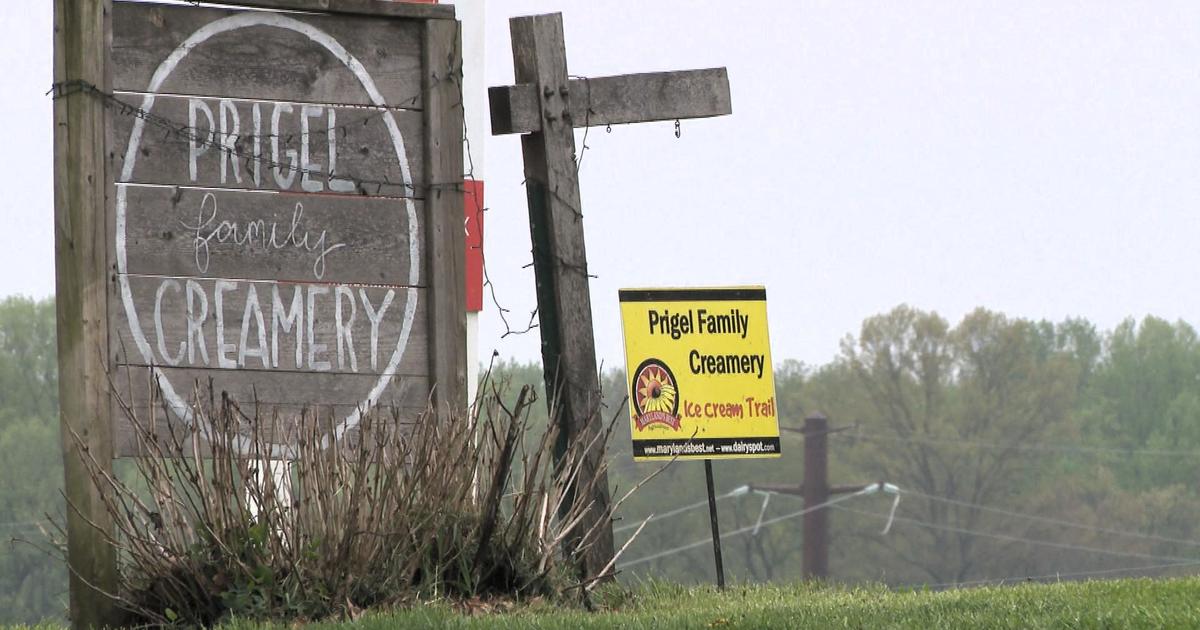Dairy Farming A Difficult Business In Md
HAGERSTOWN, Md. (AP) -- A dairy farmer's life is one of routine and discipline, each day beginning with the rising sun.
The economic side of dairy-farming isn't nearly as predictable.
"When it comes to working with cows, that's almost the easy part. You expect certain things with cows, but the economy is the challenge," said Ralph Shank, who runs Palmyra Farm with his family in Hagerstown.
Dairy farming is Washington County's single largest farming industry. The 148 dairy farms in the county account for about $45 million in annual sales, more than half of the $83 million farming accounts for each year, according to University of Maryland Extension agriculture educator Jeff Semler.
Washington County is the second largest producer of milk in the state, following Frederick County, which rakes in $51,537,000 in annual milk sales.
Milk is in demand, but because of fluctuating milk prices and the rocky economic landscape, it's impossible for dairy farmers to predict their income on a monthly basis.
Semler said most farmers sell their milk through federal dairy cooperatives, and have no control over the price of their product.
The majority of milk sold out of Washington County is in fluid form, not manufactured form, such as cheese, butter or powdered milk. Cooperatives, however, base liquid-milk prices on market-determined prices of manufactured products, not the raw product, Semler said.
The sales of manufactured products are determined on a monthly basis, and then are used to determine the price of raw milk. This means that farmers cannot predict the price of their milk, depending instead on estimates by cooperatives.
"It's a mystical thing when it comes to milk pricing," Semler said. "If you're a farmer, you have no idea what you're going to be paid for the month."
Claire Seibert, who with her husband, Mark, owns Clear Spring Creamery in Clear Spring, said they felt that selling cooperatively left them "at the mercy of co-ops," so they have been selling their products independently for a year.
"There are a lot fewer people in the middle of producing and selling," she said. "It's a lot of pressure and work, but there's a lot more value. We couldn't survive (with a co-op) with our small herd."
Seibert said she and her husband have about 100 milking cows.
They own 72 acres of land and rent an additional 40.
Farmers such as the Seiberts, who sell independently, have control over pricing, but that can be a risky business.
"The scary part about (independent marketing) is if they don't need your milk one day, they might not take it," Shank said.
"It's a co-op's job to market our milk."
Shank and his family sell through Maryland & Virginia Milk Producers Cooperative Association Inc., which guarantees that their milk will be picked up and sold each month, albeit with inconsistent pricing.
In order to gain at least some control over milk pricing, Shank said they also started marketing some of their milk with private cheese companies a few years ago.
Seibert said she and her husband sell their products in the Washington D.C., area, where there is more of a market.
"We have a system down. We know how much to bring. We split it up between two markets," she said. "Pricing is based on how much work goes into individual products."
In recent years, economic conditions have made milk pricing particularly worrisome for cooperative-dependent farmers. Shank said that in 2009, milk prices plummeted as low as $12.40 per hundredweight, the lowest in 40 years.
This year, prices have rebounded to about $22 per hundredweight, Semler said.
"Even though milk prices have gone up, and it may look a little promising, it's still a bad situation," said Ronnie Leggett, president of the Washington County Farm Bureau. "This is a real bad time with farmers. (The industry has) been depleted over the years because the economy isn't always strong enough to support it."
The recession has affected many aspects of farming, most significantly through rising costs of fuel and other expenses.
Shank said the price of feed alone increased 70 percent last year.
The poor economic situation also has affected the price of land, which many farmers own as an economic safeguard, Semler said.
Demand has been affected as well. Shank said domestic demand for milk has decreased by 2 percent in the last three or four years.
"People spend a little less at the market," Seibert said. "It costs us a lot more to do what we're doing."
Dairy farming is not an inexpensive undertaking. Semler said the average dairy farmer owns about 180 acres, and most rent additional land.
At a minimum, for a dairy farmer to survive, he or she must rent or own land and milking cows, and must own or rent basic cropping and milking equipment. For a more stable farmer, necessary amenities include tractors, mowers, a milking tank and plenty of nutritious feed.
Semler said basic expenses can easily add up to $350,000 to start a new farm.
"It's very capital-intensive," Semler said. "It's very difficult for someone to start farming without some sort of help."
Because of base expenses, many dairy farms have multigenerational family histories. Semler said every Washington County farm is family-owned, even those that call themselves companies.
Shank, for example, said his family's farm has been at the same location since 1952. His farm is on the larger side, with 300 acres of land and 150 cows.
Seibert and her husband started their milking business only five years ago. Seibert said the land has been in Mark's family for a long time, and he always had wanted to farm.
"It's been a lot harder than we thought it would be," Seibert said.
Keeping a farm running smoothly means long hours in the fields and with the cows. Semler said cows are milked two to three times a day, and each milking takes about two hours.
Although Seibert said her cows are milked only once a day and produce less than the national average, managing the farm is no easy task.
"It's so cliche, but it's a lot of hard work. It's very physical, but you see direct results of your hard work," Seibert said. "We love it. We get a lot of good feedback from our customers. We get to be outside all day. We get to be our own boss."
Information from: The Herald-Mail of Hagerstown, Md., http://www.herald-mail.com
(Copyright 2011 by The Associated Press. All Rights Reserved.)



